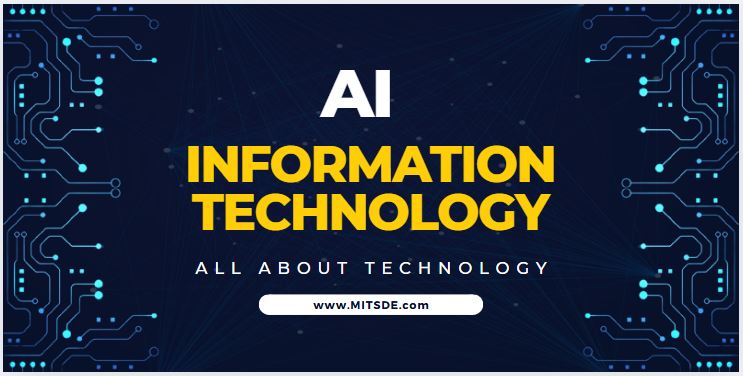
Artificial Intelligence (AI) has rapidly transformed industries across the globe, especially in Information Technology (IT). AI technologies are not only changing how IT systems operate but also how businesses leverage data, automate processes, and enhance decision-making. This evolution in IT has increased the demand for professionals skilled in AI, making programs like a PG Diploma in Information Technology essential for those looking to excel in the tech industry. Whether you’re enrolled in a post-graduate diploma in information technology or a top PGDM in information technology management, understanding AI’s impact on IT is crucial.
How AI is Transforming the IT Landscape
Automation of Routine Processes
One of AI’s most significant contributions to IT is automating repetitive tasks. AI-driven tools can handle routine data entry, monitoring, and management tasks, allowing IT professionals to focus on more complex problem-solving. For students pursuing PGDM information technology courses, automation is a core concept, highlighting the importance of AI in streamlining IT operations.
Enhanced Data Analytics
AI enables advanced data analytics, helping organizations make data-driven decisions with predictive models and deep insights. AI’s analytical power is a key focus area in top PGDM in information technology management courses, where students learn how to extract valuable insights from vast data sets. With AI, IT professionals can better predict trends, detect anomalies, and drive strategic planning.
Improved Cybersecurity
Cybersecurity is a priority in the IT industry, and AI plays a critical role in strengthening it. AI-powered tools can detect and respond to threats faster than traditional methods, analyzing patterns in real time to identify vulnerabilities. In top PG diploma information technology programs, students explore how AI enhances security through continuous monitoring and threat detection, making networks safer for organizations.
Intelligent IT Support
AI-driven chatbots and virtual assistants are transforming IT support by providing round-the-clock assistance and troubleshooting. These tools use natural language processing (NLP) to understand and respond to user inquiries. For students in PGDM information technology courses, learning to implement intelligent IT support solutions is a valuable skill, as it reduces response times and improves the overall user experience.
Infrastructure Management
AI assists in managing IT infrastructure by predicting potential hardware failures and monitoring system performance. Many post-graduate diploma in information technology programs emphasize AI’s role in infrastructure management, teaching students how predictive analytics can prevent downtime and improve efficiency. AI-powered tools help organizations anticipate issues and allocate resources effectively, making systems more resilient.
Personalized User Experiences
From tailored recommendations to customized interfaces, AI enables personalized experiences in software and application development. By analyzing user behavior, AI-powered applications can provide more relevant content, optimize user journeys, and increase engagement. In top PGDM in information technology management programs, students learn to integrate AI for creating adaptive, user-centered designs.
Key Areas Where AI is Shaping IT Careers
For those pursuing the best PG diploma information technology, AI proficiency is becoming a core skill. Here are some areas where AI knowledge is especially valuable for IT professionals:
- Data Science and Analytics: AI is essential in analyzing large data sets, making data science a popular career path for IT graduates.
- Machine Learning Engineering: Developing and training AI models for automation, analysis, and decision-making processes is a high-demand skill.
- Cybersecurity Analysis: AI improves the speed and accuracy of threat detection, making it an invaluable tool for cybersecurity specialists.
- Software Development: AI-driven development enhances user experience through personalized applications and smarter functionalities.
For students enrolled in PGDM information technology courses or the top PGDM in information technology management, acquiring expertise in these AI applications can significantly enhance career prospects.
Why Choose a PG Diploma in Information Technology to Excel in AI?
A PG Diploma in Information Technology offers a solid foundation in AI and related fields, blending theoretical knowledge with practical applications. Programs like MITSDE’s top PGDM in information technology management cover AI’s role in IT, preparing students to address current industry needs. Here’s why pursuing a best PG diploma information technology can be a smart choice:
- Industry-Relevant Curriculum: Courses are tailored to the latest trends, ensuring that students learn skills applicable to today’s tech landscape.
- Hands-On Experience: Practical projects allow students to work on real-world applications of AI in IT, building a strong portfolio for job opportunities.
- Career Support and Networking: Many programs offer career support and industry connections, helping graduates secure roles in competitive fields like data science and machine learning.
Conclusion
The impact of artificial intelligence on information technology is undeniable, transforming how organizations operate and innovate. For IT professionals, mastering AI is no longer optional; it’s essential. Pursuing a post-graduate diploma in information technology or a top PGDM in information technology management can provide the skills and knowledge needed to navigate this AI-driven era effectively. Programs like those at MITSDE offer comprehensive AI and IT management training, making them the best PG diploma information technology options for those looking to stay ahead in the field.
Embrace AI’s potential in IT, and consider enrolling in a specialized program to unlock a world of career possibilities.



